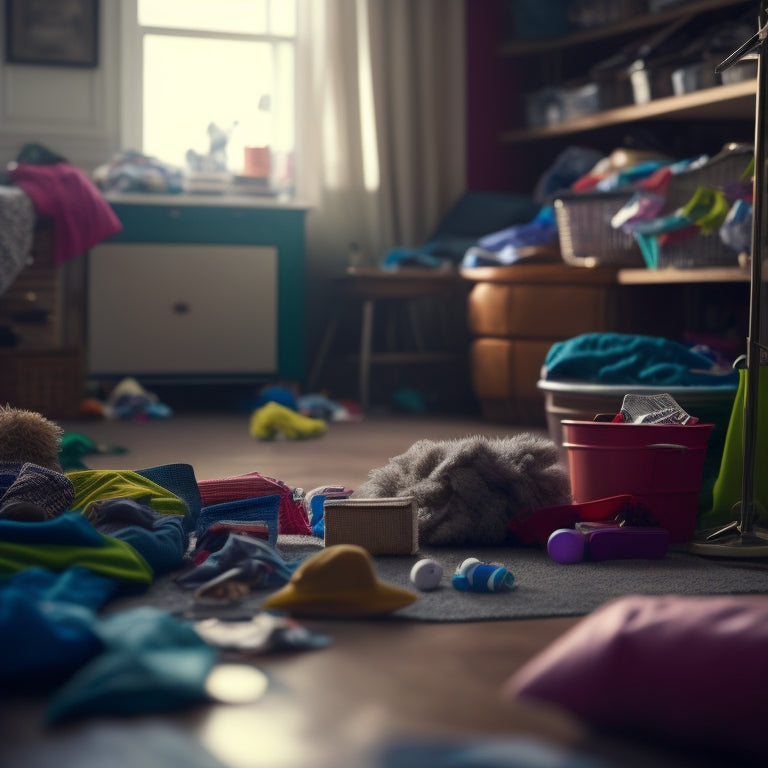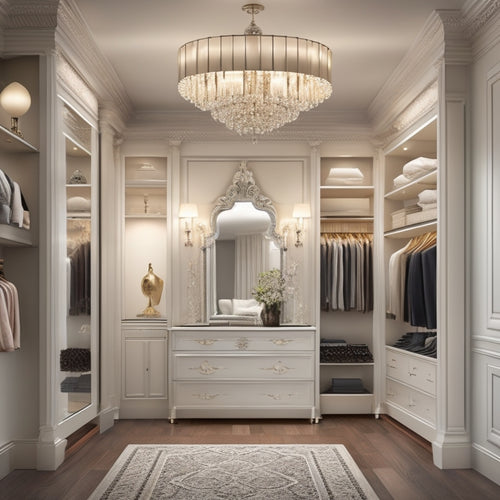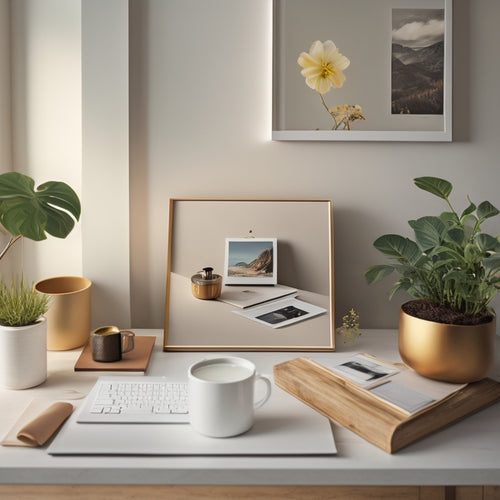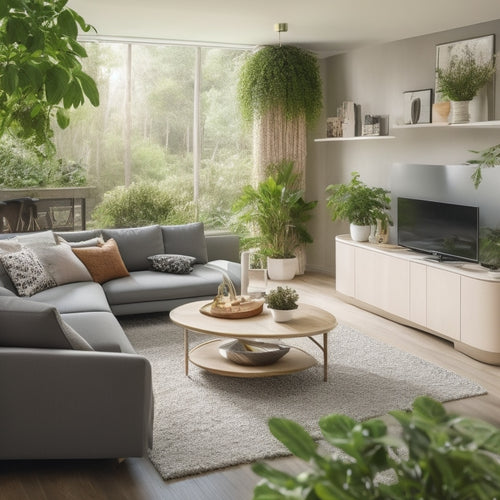
What's Holding You Back From a Clutter-Free Home?
Share
You're likely stuck in a cluttered living space due to a combination of factors. Limited storage space, inefficient organizing systems, and emotional attachment to items are common obstacles. Busy schedules and procrastination can also hinder your efforts, while unrealistic expectations and clutter-prone family members can add to the chaos. Additionally, inadequate maintenance habits, poor space planning design, and insufficient decluttering skills can further complicate the issue. By understanding these challenges, you can start to identify the root causes of your clutter and take the first steps towards a more organized, peaceful living space - and there's more to discover.
Key Takeaways
• Lack of storage space and inefficient organizing systems can lead to clutter accumulation and disorganization.
• Emotional attachment to sentimental items and fear of letting go can hinder decluttering efforts and create clutter buildup.
• Busy schedules and procrastination can delay decluttering tasks, allowing clutter to persist and grow.
• Unrealistic expectations and goals, as well as inadequate maintenance habits, can prevent the achievement of a clutter-free home.
• Insufficient decluttering skills, poor space planning design, and clutter-prone family members can also hold you back from a clutter-free home.
Lack of Storage Space
When you're struggling to find a place to put things, it's usually because you're dealing with a lack of storage space, which can make your home feel cramped and chaotic. You're not alone in this battle! Many of us face the same dilemma, especially in small homes or apartments.
The good news is that there are creative storage solutions to help you maximize your space. Start by thinking outside the box (or shelf). Consider vertical storage options like wall-mounted shelves or storage units that go up to the ceiling. You can also repurpose items like old crates or baskets to create unique storage containers.
Small space organization is all about being intentional with your belongings and using every available inch wisely. By implementing these strategies, you'll be amazed at how quickly your space transforms from cluttered to calm.
Inefficient Organizing Systems
As you aim to create a clutter-free home, you've likely encountered inefficient organizing systems that hinder your progress. These systems often stem from a lack of clear goals, insufficient storage solutions, and inadequate labeling systems - issues you're probably all too familiar with.
Lack of Clear Goals
What's holding you back from achieving a clutter-free home is likely the lack of clear goals that guide your organizing efforts. Without a clear direction, you'll find yourself stuck in a cycle of clutter and disorganization. It's like trying to navigate a road trip without a map - you might make progress, but you'll likely end up lost and frustrated.
Here are three reasons why a lack of clear goals is holding you back:
-
No motivation: Without a clear goal in mind, you'll struggle to find the motivation to start (and stick to) your organizing project.
-
No direction: Without a clear goal, you'll waste time and energy on tasks that don't get you closer to your desired outcome.
-
No sense of accomplishment: Without a clear goal, you'll never feel a sense of accomplishment and pride in your organizing efforts.
To overcome this, take some time to set specific, achievable goals for your organizing project. Visualize what success looks like, and break it down into actionable steps. With a clear goal in mind, you'll be motivated to take action and make progress towards a clutter-free home.
Insufficient Storage Solutions
Now that you've set clear goals for your clutter-free home, it's time to assess whether your storage solutions are truly supporting your vision, or if they're actually hindering your progress.
Let's face it, we've all been guilty of cluttering up our closets and cupboards with stuff we don't need, simply because we didn't have a better place to put it. But, it's time to get creative! Think outside the box (or closet) and look for opportunities to maximize your space with creative storage solutions. Consider installing shelves, hooks, or baskets to keep items off the floor and out of the way.
It's also essential to have functional storage solutions that make sense for your lifestyle. Are you a busy bee who needs quick access to your morning coffee mug? Designate a spot near the coffee maker for a mug tree or hook. Do you have a crafty side and need a place to store your supplies? Invest in a storage ottoman or cart with drawers.
Inadequate Labeling Systems
You're likely familiar with the frustration of searching for a specific item in a cluttered space, only to realize that it's hidden behind a messy pile of similar items, all because you lacked a clear labeling system. It's like searching for a needle in a haystack, only the haystack is your entire closet or garage.
Here are three emotional triggers that might resonate with you:
-
Wasting precious time: You've spent hours searching for something you know you have, only to find it in a totally unexpected place.
-
Feeling overwhelmed: You're paralyzed by the thought of tackling that cluttered area because you don't know where to start.
-
Experiencing anxiety: You're worried that you'll never find what you need, or that you'll lose something important in the chaos.
Inadequate labeling systems can be a major obstacle to achieving a clutter-free home. Without clear labels, it's easy for items to get lost or misplaced, leading to frustration and disorganization.
Emotional Attachment to Items
As you begin to sort through your belongings, you're likely to encounter items that hold sentimental value, such as gifts from loved ones or mementos from special events.
You might find yourself struggling to part with these items, even if they no longer serve a practical purpose, because they're connected to fond memories or emotions.
Recognizing the emotional attachment you have to these objects and facing the fear of letting go is crucial in creating a more organized and clutter-free space that genuinely reflects your needs and values.
Sentimental Value Objects
Your sentimental value objects, those items you've held onto for years, evoke powerful emotions and memories, making it incredibly tough to part with them. You're not alone in this struggle. We've all got that one item (or 10) that we just can't seem to let go of.
Here are a few examples that might hit close to home:
-
Grandma's antique vase: It's been collecting dust on your shelf for years, but the thought of getting rid of it feels like you're getting rid of her.
-
Your kid's artwork: Those macaroni masterpieces mightn't be museum-worthy, but they're still precious to you.
-
Your wedding dress: Even if it's been years since the big day, the thought of parting with that dress feels like you're letting go of the memories too.
It's time to acknowledge that your emotional attachment to these items is holding you back from a clutter-free home. The good news is that you don't have to choose between keeping the memory and keeping the item. There are organizing strategies that can help you preserve the memory while still decluttering your space.
It's time to get creative and find a solution that works for you.
Fear of Letting Go
The emotional weight of these sentimental objects can be overwhelming, making it difficult to confront the underlying fear that's hindering you from letting go of them. You're not alone in this struggle. Many people develop hoarding tendencies due to anxiety triggers, and acknowledging the emotional attachment behind your actions is crucial.
Ask yourself, 'What's driving my attachment to these items?' Is it fear of losing memories or a sense of control? Are you using these objects as a coping mechanism for underlying attachment issues or control struggles? Once you identify the root cause, you can start working on letting go.
Busy Schedules and Procrastination
Managing a household while juggling a jam-packed schedule often leaves you struggling to find time for organization, making it convenient to delay decluttering tasks until later. You're not alone in this struggle! It's simple to fall into the trap of procrastination, thinking you'll get to it 'later' or 'when you have more time.' But let's be honest, later often turns into never.
Here are a few emotional roadblocks that might be holding you back:
-
Feeling overwhelmed: You look around at the clutter and think, 'Where do I even start?'
-
Lack of motivation: You just don't feel like dealing with it right now.
-
Fear of failure: What if you start organizing, and it doesn't turn out as flawless as you envisioned?
To overcome these obstacles, prioritizing your tasks and setting realistic deadlines is crucial. Begin by breaking down your decluttering tasks into smaller, manageable chunks. Allocate specific times in your schedule for organization, and stick to it.
Unrealistic Expectations and Goals
As you start on your decluttering adventure, it's important to recognize that perfection is not the goal, and aiming for an unrealistic ideal can be a significant obstacle to achieving a clutter-free home. You're not trying to win a 'Best Organized Home' award, but rather create a space that feels peaceful and functional for you and your family.
| ** Unrealistic Expectations ** | ** Realistic Goals ** |
|---|---|
| A spotless home 24/7 | A tidy home most of the time |
| Never buying anything again | Making intentional purchasing decisions |
| Having a minimalist aesthetic | Creating a comfortable, clutter-free space |
Overcoming perfectionism and setting boundaries is key. Remember, it's about finding balance and managing expectations. You can't have a perfect home and still have a life, so it's vital to prioritize what matters most to you. By letting go of unrealistic expectations, you'll be more motivated to take action and make progress towards your decluttering goals. So, take a deep breath, be kind to yourself, and focus on creating a home that sparks joy and serenity – not one that's perfect, but one that's perfectly yours.
Clutter-Prone Family Members
You're likely to encounter at least one family member who's a harder time letting go of their belongings or struggles with maintaining organized spaces. Recognizing that clutter-prone habits are often deeply rooted in an individual's personality, upbringing, or emotional attachment to items is crucial.
Here are 3 common scenarios you might face:
-
The Sentimental Saver: They hold onto items due to emotional attachment, making it challenging to part with gifts, mementos, or heirlooms.
-
The Busy Bee: They're always on-the-go, leaving little time for organization and maintenance, resulting in cluttered spaces.
-
The Pack Rat: They've a hard time letting go of items, fearing they might need them someday, leading to an accumulation of clutter.
When dealing with clutter-prone family members, it's vital to approach the situation with empathy and understanding. Avoid criticizing or judging their habits, as this can lead to defensiveness and hinder progress. Instead, focus on having open and honest conversations about the impact of clutter on your shared living space.
Inadequate Maintenance Habits
Every week, clutter accumulates in your home due to inadequate maintenance habits, such as neglecting to put away belongings, skipping routine cleaning, or failing to establish a regular organizational routine. You're not alone - many of us struggle to maintain a clutter-free home. But, it's time to face the music: inadequate maintenance habits are holding you back from achieving your clutter-free dream.
| Current Habits | New Habits |
|---|---|
| Leaving dirty dishes overnight | Washing dishes immediately after dinner |
| Skipping weekly tidying | Setting aside 10 minutes daily for decluttering |
| Ignoring clutter hotspots | Creating a regular cleaning schedule |
To break the cycle of clutter, you need to adopt daily decluttering and regular maintenance habits. Start small by dedicating 10 minutes each day to tidying up and putting away belongings. Establish a regular cleaning schedule to keep clutter hotspots under control. Remember, maintaining a clutter-free home requires consistent effort, but the payoff is worth it. By making these small changes, you'll be well on your way to a more organized, peaceful living space.
Poor Space Planning Design
Now that you've started tackling inadequate maintenance habits, it's time to focus on how poor space planning design might be contributing to your clutter problem. You might be surprised at how a well-designed space can make a huge difference in your ability to stay organized.
Here are three ways poor space planning design might be holding you back:
-
Inefficient space utilization: Are there areas in your home where you're wasting valuable space? Maybe you have a large closet, but it's not optimized for storage, leading to cluttered floors and shelves.
-
Poor interior layout: Is your furniture arranged in a way that creates bottlenecks and makes it difficult to move around? This can lead to clutter building up in areas where you're more likely to trip over it.
-
Lack of storage solutions: Do you have enough storage solutions in place to keep your belongings organized? Without adequate storage, clutter can quickly pile up and overwhelm your space.
Insufficient Decluttering Skills
Without effective decluttering skills, it's easy to get stuck in a cycle of clutter accumulation, where the same items are shuffled from one area to another without ever really being dealt with.
You might feel like you're making progress, but in reality, you're just moving clutter around. To break this cycle, you need to develop some solid decluttering techniques.
Consider adopting a minimalism approach, where you focus on keeping only what brings value or joy to your life. If you're struggling, don't be afraid to seek help from a professional organization expert or clutter coach.
They can provide you with personalized guidance and support to help you overcome your decluttering challenges. With the right skills and mindset, you can start making real progress towards a clutter-free home.
Frequently Asked Questions
How Do I Declutter Sentimental Items Without Feeling Guilty?
Imagine the weight of nostalgia lifting off your shoulders as you declutter sentimental items. You're not heartless, you're just acknowledging the emotional attachment holding you back from freedom. Let go, and the guilt will follow – you'll be left with a lighter, more organized you!
Can a Clutter-Free Home Be Maintained With Young Children?
You can absolutely maintain a clutter-free home with young children! Implement child-friendly organization systems, and focus on maintaining balance between tidy spaces and letting kids be kids - it's all about finding that sweet spot!
Is It Possible to Declutter When Living With a Hoarder?
You're probably thinking, "Peaceful living with a hoarder? Yeah, right!" But, surprisingly, it's possible with the right approach. Join support groups, consider therapy, and enlist professional organizers for a gentle intervention - it's time to take back your space!
How Often Should I Declutter and Organize My Living Space?
You should declutter and organize your living space regularly, aiming for monthly maintenance and seasonal thorough cleanings, using methods like KonMari to tackle clutter hotspots, and remember, it's a process, not a perfect science!
Can I Hire Someone to Declutter and Organize My Home for Me?
You're wondering if you can hire a decluttering superhero to save the day? Yes, you can! Hiring professional help brings benefits like accountability, customized systems, and a fresh perspective, making outsourcing decluttering a game-changer for your sanity and space.
Related Posts
-

Design Your Dream Closet With Online Software
With online software, you can transform your closet into a personalized retreat that reflects your unique style, effo...
-

Simplify Your Digital Life: Photo and Video Organization
You're drowning in a sea of digital clutter, with thousands of disorganized photos and videos scattered across your d...
-

What Is a Smart Island for Home?
You're likely familiar with traditional kitchen islands, but a smart island for your home takes this concept to the n...


